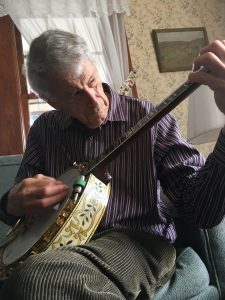 Early in his career, at places like Your Father’s Moustache and The Salty Banjo, Jimmy Mazzy carved out a place for himself on the bandstand by strumming loud and fast. But that’s not why Mazzy got into jazz. He got into it: “because of the way it made me feel inside.” He plays music not to massage his ego, but to communicate the deep feelings he has to an audience—to try and make them feel what he does. This is the pathway to making soulful music Mazzy chose 50 years ago; the pathway he still pursues.
Early in his career, at places like Your Father’s Moustache and The Salty Banjo, Jimmy Mazzy carved out a place for himself on the bandstand by strumming loud and fast. But that’s not why Mazzy got into jazz. He got into it: “because of the way it made me feel inside.” He plays music not to massage his ego, but to communicate the deep feelings he has to an audience—to try and make them feel what he does. This is the pathway to making soulful music Mazzy chose 50 years ago; the pathway he still pursues.
Jimmy and I recently spent several hours together and as we talked, the room became filled with laughter, deep thought, and occasional profanity. It was unusual for a conversation between journalist and musician, as we talked not just about the who, what, and where, but about the why. It led to some unexpectedly intimate moments and comments, many of which I included in this portrait in order to show as many sides of this complicated man as I could. To leave anything out would be like playing “She’s Funny That Way” and leaving out the sweet, unexpected passing chords that Mazzy uses so well.
Mazzy was born in Norwalk, Connecticut, on May 21, 1942, and a year later the family, composed of Jimmy, mom, dad and older brother Jack, moved to Lexington, Massachusetts. Dad did his part in the war and later went into sales—mostly, dairy supplies. Mom was not happy being just a homemaker and eventually became a Medical Secretary at Mass General Hospital.
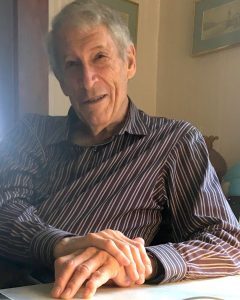 When Jimmy was young, music in the house was provided by a used wind-up Victrola. He says the records were mostly the pop music of the day. I asked if his dad had any hot records. His reply: “Well, lukewarm” and added: “I didn’t play it at the right speed…I broke the cam that prevented the tone arm from swinging all the way over to the other side, and being played against the grooves, it used to act as a plow…” Not really a propitious start. The family didn’t get an electric record player until 1948-49. As far as his radio listening, Jimmy says his taste wasn’t very discriminating: Hayloft Jamboree on WCOP and the pop music of the day—Patti Page, Bing Crosby, Kay Starr… Later, when R&B started to cross over, he heard and liked Bo Diddley, Elvis, and Fats Domino. Thoughts of being a musician were not much on his mind.
When Jimmy was young, music in the house was provided by a used wind-up Victrola. He says the records were mostly the pop music of the day. I asked if his dad had any hot records. His reply: “Well, lukewarm” and added: “I didn’t play it at the right speed…I broke the cam that prevented the tone arm from swinging all the way over to the other side, and being played against the grooves, it used to act as a plow…” Not really a propitious start. The family didn’t get an electric record player until 1948-49. As far as his radio listening, Jimmy says his taste wasn’t very discriminating: Hayloft Jamboree on WCOP and the pop music of the day—Patti Page, Bing Crosby, Kay Starr… Later, when R&B started to cross over, he heard and liked Bo Diddley, Elvis, and Fats Domino. Thoughts of being a musician were not much on his mind.
Jimmy wasn’t doing very well academically at Lexington High, so his parents “scraped together the money” to send him to Buckingham, Brown, and Nichols, a private school in Cambridge. He found that some of the older kids at the school were listening to jazz like Brubeck, Garner, Goodman, and Kenton and this music intrigued him. The key episode, though, was his brother’s playing him a Bix record: “That really appealed to me in a big way,” Mazzy says. “It brought echoes of stuff I’d heard years before that, cranking the Victrola. It was the…what I still feel in this music is kind of a pensive, resigned sadness. That has sort of a resonance with me, because I don’t think I’ve ever been a terribly happy person. I don’t mean to say that melodramatically, it’s just a matter of fact…The story of his [Bix’s] demise and the music are sort of inseparable.” There’s an honesty and openness in these comments that parallels Mazzy’s desire to speak the truth in his music.
Mazzy began to have a go at the banjo in the mid-1950s. He acquired a student banjo with “…an action that you could have slid a poker chip under, so I didn’t get very far with that.” Later, when he went to Bates College, he acquired a better instrument. He tells me that fact with some regret, as if it was a personal indulgence that was a kind of insult to the sacrifice his parents were making to send him to college. Jimmy carries that tone of regret when relating that he left school after three years, without graduating.
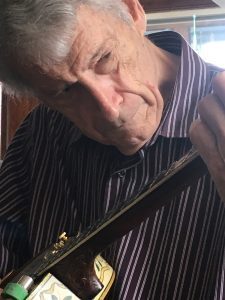 Mazzy always had issues with academics and candidly admits that he may be “on the spectrum,” with learning disabilities that seem to have been vaguely diagnosed back in the day, but which led to no effective treatment. Those same kinds of issues arose in terms of trying to read music, which he does not do and which he regrets not doing. There’s always a discussion in jazz about how important reading music is, as so many of the greats were not readers. Consensus is that it’s a great skill to have, but if you don’t have great ears, you can never be the kind of player Mazzy is.
Mazzy always had issues with academics and candidly admits that he may be “on the spectrum,” with learning disabilities that seem to have been vaguely diagnosed back in the day, but which led to no effective treatment. Those same kinds of issues arose in terms of trying to read music, which he does not do and which he regrets not doing. There’s always a discussion in jazz about how important reading music is, as so many of the greats were not readers. Consensus is that it’s a great skill to have, but if you don’t have great ears, you can never be the kind of player Mazzy is.
While at college, Jimmy was not single-minded about music and was also drawn to literature, citing especially the work of Hemingway, O. Henry, and Melville. “Moby Dick, even though the teacher discouraged this point of view being gleaned out of it, subscribed to the view that the creative force in the universe was malevolent, as symbolized by the whale; man’s futility as Ahab. That stuck in my craw for the rest of my life.”
He also listened to classical music, but offers the unique perception of a deep listener: that Wagner was the closest thing in classical music to a blood brother to James Brown. “There’s a passage in Tannhäuser…that has the cadence and the sound of somebody really plowing it home in a motel room. The panting…When I heard James Brown and Cold Sweat in 1967, that made me feel something…” Mazzy also developed an attraction in his youth for the work of operatic tenor recording star Caruso (as had Louis Armstrong). “To me, the miracle of his singing is how he managed to get his heart and soul into his vocals…in a cut-down band that had to be used because of the limitations of early acoustic recordings.”
Jimmy took a few lessons on banjo, but mostly he played along with records and essentially entered the professional world of music self-taught. His first job was in the Salty Banjo in Hull, a paddle-wheeler plopped on the beach. He described sweating like a pig in the unventilated room and laughingly says: “If you wanted to take some air outside, you had to take your chances on a deck with large holes you couldn’t see because they were covered up by tar paper.” Call it the beginning of many years of paying dues.
His skills increased to the point that he was hired at Your Father’s Moustache, a national “Dixieland” music franchise. Finesse was not the order of the day. Says Mazzy: “…Tempos started at presto and ended at tempo de tear-ass…They sold a lot of beer and they sold a lot of peanuts, which became guided missiles to the band.”
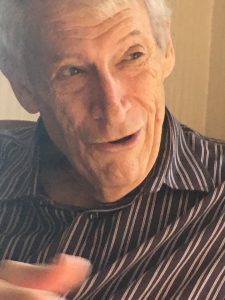 Important to Mazzy at this time were the brothers Gary and Jean Blood, whom he met in 1965 and with whom he played for two years at the Tally Ho in Easton, Mass. (Nick the owner raised pigs behind the club, but Mazzy doesn’t think that inspired the club’s name). He recalls a record he made in the Tally Ho in the mid-1960s which he calls unique “because it loses about a quarter of a tone three-quarters of the way through the record due to the fact that the ice machine came on and it drew current that the recorder needed.” He adds: “On that record I could hear what I was trying to do but I didn’t have enough facility to make runs between chord structures…I tried to listen for licks that were within my ability to play.” I asked Jimmy when he added singing to his repertoire: “I probably started singing in the early ’60s, in frustration for what I couldn’t play.” His facility with licks increased and his vocals connected strongly with people, greatly enhancing his capacity to communicate and hence, his career.
Important to Mazzy at this time were the brothers Gary and Jean Blood, whom he met in 1965 and with whom he played for two years at the Tally Ho in Easton, Mass. (Nick the owner raised pigs behind the club, but Mazzy doesn’t think that inspired the club’s name). He recalls a record he made in the Tally Ho in the mid-1960s which he calls unique “because it loses about a quarter of a tone three-quarters of the way through the record due to the fact that the ice machine came on and it drew current that the recorder needed.” He adds: “On that record I could hear what I was trying to do but I didn’t have enough facility to make runs between chord structures…I tried to listen for licks that were within my ability to play.” I asked Jimmy when he added singing to his repertoire: “I probably started singing in the early ’60s, in frustration for what I couldn’t play.” His facility with licks increased and his vocals connected strongly with people, greatly enhancing his capacity to communicate and hence, his career.
While at the Tally Ho, Mazzy picked up the trade of piano tuning from the brother of the club’s owner, to whom he’d signed on as a kind of Man Friday. Such skills have always been useful for jazz musicians whose gigs sometimes do not cover the monthly nut. Jimmy says: “It’s been a good way to round out something that suggested a living.” He continues to tune pianos to this day and one of his best customers is Peter Kontrimas, owner of the well-known PBS studios in Westwood, Mass.
Jimmy continued to gig, mostly in the Eastern Mass area, through the next decade, although in 1979, a group he’d been playing with, John Sheehan’s Heritage Jazz Band traveled to the Sacramento Heritage Jazz Festival. He has sporadically travelled to festivals in the US and England since that time.
He lived on Lake Chabacco in Essex, Mass., “drinking a lot of beer and spinning his wheels,” when two friends, Bob and Mary Osgood intervened to bring him more intensively into the scene and, in 1978, they produced a record where Jimmy was featured for the first time: Jimmy Mazzy Sings. He moved in with the Osgoods in Malden and characterizes it as “a curious time in life.”
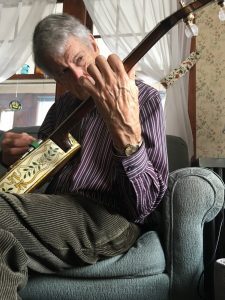 In 1980, a much wider circle of people became acquainted with Mazzy when he succeeded Reggie Phillips, who retired as pianist at the Colonial Inn in Concord. Mainstays in that first band were Fred Lynn, cornet; Paul Meyrayas, clarinet; Al Ehrinfried, bass; Fran Bacon, drums; and occasionally, Dave First on washtub bass. Jimmy continued to play there, with a couple of brief hiatuses, for 35 years. The tenure came to an end in 2015 when the owner of the Inn replaced the standard tables with high-top tables and chairs. This made mobility hard for Jimmy’s wife Carrie, who’s been dealing with health problems and for many of the band’s regular guests, who are elderly. Jimmy tried to negotiate with the owner, but was unsuccessful and Mazzy said there was no choice but to end the gig.
In 1980, a much wider circle of people became acquainted with Mazzy when he succeeded Reggie Phillips, who retired as pianist at the Colonial Inn in Concord. Mainstays in that first band were Fred Lynn, cornet; Paul Meyrayas, clarinet; Al Ehrinfried, bass; Fran Bacon, drums; and occasionally, Dave First on washtub bass. Jimmy continued to play there, with a couple of brief hiatuses, for 35 years. The tenure came to an end in 2015 when the owner of the Inn replaced the standard tables with high-top tables and chairs. This made mobility hard for Jimmy’s wife Carrie, who’s been dealing with health problems and for many of the band’s regular guests, who are elderly. Jimmy tried to negotiate with the owner, but was unsuccessful and Mazzy said there was no choice but to end the gig.
In 1983, Jimmy met his future wife Carrie in a club in Salem, Mass. Jimmy and Carrie were both coming off first marriages and he characterized them as being “two lost ships.” He was open with me about some of the issues that they both had to deal with, and which I feel no need to publish here. I will say, however, that he says Carrie was living in a house “…that would have fallen down if the termites had quit holding hands.” In any case, they found a strong mutual attraction and married two years later, in 1985, and have been constant companions ever since, despite the fact, as Jimmy says: “Some people forecast a short duration for our marriage.”
Unlike many other jazz musicians, he never turned to teaching as a way of supplementing his income. When asked why, he said: “Teaching is a valuable thing. I began to realize in teaching that I was not only the person trying to explain. I was the pupil. I was learning things I didn’t know I didn’t know…[but] I don’t have any modus operandi to teach by. I’ve done it a few times, but I really can’t explain a system.” When Jimmy said that, I thought to myself: that’s never stopped a lot of people who thought they could teach.
As far as influences on Mazzy’s playing, I think it would be hard to narrow those down. There’s Bix and his crowd, of course, and he’s strong for Louis Armstrong, and spoke at length about the banjo playing of Johnny St. Cyr and the many creative things he did on the Armstrong Hot Five recordings. Jimmy’s careful listening finds deeper emotional implications in the music. For example, here’s his interesting take on Armstrong in the early 1930s: “He did things that were very ambivalent. They had an overlay of exuberance and an undercurrent of tragedy or unhappiness; to my hearing, which may be all f—ed up and maybe no one else would agree with. It was humor and pathos.”
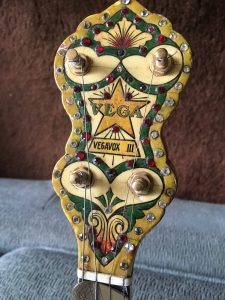 Since he entered the mainstream of traditional jazz music, the list of groups and people that Mazzy has played with is enormous: Butch Thompson, Dick Shooshan’s Golden Eagles, Ken Keeler’s Devil Mountain Jazz Band, George Knoblauch’s Black Diamond Blue Five, the Professor Plum Jazz Band led by cornetist Phil Kirk, Bob Schultz (associated with Turk Murphy.) International associations include playing with the Paris Washboard, Fenix (Argentina), and New Wolverines (Australia). He is a member of John Clark’s Wolverine Jazz Band, Jeff Hughes’s Brahmin Bellhops; and Alan Adam’s (founder of the San Diego Jazz Festival) New Orleans Wanderers at the San Diego Festival. Jimmy plays every year with the Williams Reunion Jazz Band,
Since he entered the mainstream of traditional jazz music, the list of groups and people that Mazzy has played with is enormous: Butch Thompson, Dick Shooshan’s Golden Eagles, Ken Keeler’s Devil Mountain Jazz Band, George Knoblauch’s Black Diamond Blue Five, the Professor Plum Jazz Band led by cornetist Phil Kirk, Bob Schultz (associated with Turk Murphy.) International associations include playing with the Paris Washboard, Fenix (Argentina), and New Wolverines (Australia). He is a member of John Clark’s Wolverine Jazz Band, Jeff Hughes’s Brahmin Bellhops; and Alan Adam’s (founder of the San Diego Jazz Festival) New Orleans Wanderers at the San Diego Festival. Jimmy plays every year with the Williams Reunion Jazz Band,
Mazzy has recorded scores of albums and been featured on at least 30 of them, many on the Stomp Off label. Mazzy also played banjo in the soundtrack for several Hollywood movies: Eight Men Out, Wild Hearts Can’t Be Broken, and Tumbledown.
Mazzy grudgingly admits to knowing about 1000 songs and is the leader of Jimmy Mazzy & Friends, but when asked about leading a group, Jimmy speaks plainly: “It’s a pain in the ass to lead a band…I don’t know what kind of adrenaline people generate who do this constantly.” Anyone who’s had the pleasure of hearing his recordings or seeing him play live knows that he is not without technique—as a singer or a banjo player, but it’s very hard for Mazzy to acknowledge how much skill he has. “I don’t have perfect pitch, I have something marginally suggesting it but not reaching it. I hear C flat for C.” In September he was inducted into the Banjo Hall of Fame and when I ask how he felt about that, he expresses some bewilderment: “I felt like Gulliver in Brobdingnag.” In other words, like a midget among giants, but I think the people at the Hall of Fame know what they’re doing.
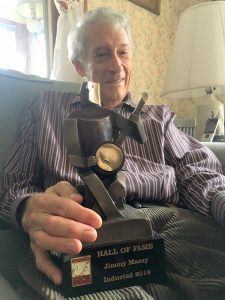 I asked for his thoughts on the future of traditional jazz. “In the next 10 to 20 years, I’m not sure what the hell will happen…There are skiffle bands down in New Orleans playing old stuff and there are one or two around Boston with ties to the Conservatory…I don’t see anything like the wave of interest there was in traditional jazz in the ’60, ’70s, and ’80s.” He cited the New Black Eagle Jazz Band gig at the Sticky Wicket in Hopkinton as perfectly timed to take advantage of that peak.
I asked for his thoughts on the future of traditional jazz. “In the next 10 to 20 years, I’m not sure what the hell will happen…There are skiffle bands down in New Orleans playing old stuff and there are one or two around Boston with ties to the Conservatory…I don’t see anything like the wave of interest there was in traditional jazz in the ’60, ’70s, and ’80s.” He cited the New Black Eagle Jazz Band gig at the Sticky Wicket in Hopkinton as perfectly timed to take advantage of that peak.
“The best days of festivals that I can recall are probably in the ’70s and ’80s” he continued, “the Sacramento Festival was a huge one…That festival seems to have moved on to swing…what you see is still a pretty impressive array of festivals but we’re a gray-haired bunch of players and a gray-haired audience. There are some youthful exceptions, but not many that I see.” He notes that festivals are condensing: “Smaller festivals are collapsing and the audience is being absorbed into larger festivals.”
Jimmy is still making local gigs and occasional festivals and tuning pianos, but there are medical needs that must be attended to and Jimmy’s future musical life will depend, to some extent, on how well Carrie’s recovery from a not-well-done heart operation proceeds.
When pressed to say something positive about himself, Jimmy replies with a courtly reluctance: “If I can say this—I think my strongest weapon is nuance in chords. Passing tones, some substitute harmony. On a banjo it doesn’t happen that often.” How does he see his contribution, in a general sense? He searches for a reply and finally says that he has been supportive of informal jam sessions.
I was somewhat abashed that this man, so highly spoken of and esteemed by so many people in the traditional jazz community is so hard pressed to acknowledge his own value. Further pressed, he finally says: “I don’t know if it’s simply a matter of having your face hanging out for so many years that it becomes familiar to the people who follow the music.” Then he ends the session by saying to me: “If I attempted to play something, would that be of any significance for you?” Brother, it sure would.
Watch the video and you’ll see the commitment Jimmy brings to even an informal performance in his living room. At gigs, he can still strum up a storm on workhorses like “That’s a Plenty,” but listening to him, sitting on his sofa, deftly and creatively performing “She’s Funny That Way” points to the qualities that have set him apart. He knows and can play any tune anyone would call, but it’s in ballads and medium tempos that you get a real glimpse of the inner man—ready to dig deep in order to get to the core of the music. When a musician has the skill and experience to translate his vulnerability into music, you have something rare. You have Jimmy Mazzy.
Jimmy Mazzy was most recently featured with The Riverboat Stompers Jazz Band on the CD It’s About Time, which was reviewed in the November 2019 issue of The Syncopated Times. Earlier this year he was featured in a review of the Wolverine Jazz Band’s latest. For a partial list of Jimmy’s CDs, please visit nejazz.com/oldsite/JimmyCDs.htm.
Steve Provizer is a brass player, arranger and writer. He has written about jazz for a number of print and online publications and has blogged for a number of years at: brilliantcornersabostonjazzblog.blogspot.com. He is also a proud member of the Screen Actors Guild.






















